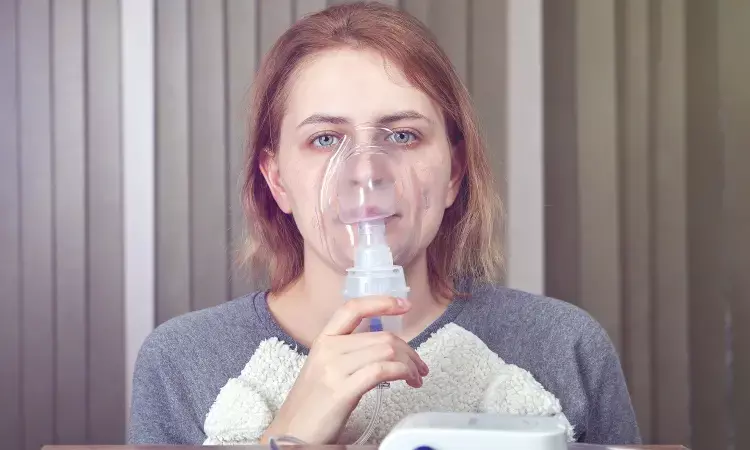- Home
- Medical news & Guidelines
- Anesthesiology
- Cardiology and CTVS
- Critical Care
- Dentistry
- Dermatology
- Diabetes and Endocrinology
- ENT
- Gastroenterology
- Medicine
- Nephrology
- Neurology
- Obstretics-Gynaecology
- Oncology
- Ophthalmology
- Orthopaedics
- Pediatrics-Neonatology
- Psychiatry
- Pulmonology
- Radiology
- Surgery
- Urology
- Laboratory Medicine
- Diet
- Nursing
- Paramedical
- Physiotherapy
- Health news
- Fact Check
- Bone Health Fact Check
- Brain Health Fact Check
- Cancer Related Fact Check
- Child Care Fact Check
- Dental and oral health fact check
- Diabetes and metabolic health fact check
- Diet and Nutrition Fact Check
- Eye and ENT Care Fact Check
- Fitness fact check
- Gut health fact check
- Heart health fact check
- Kidney health fact check
- Medical education fact check
- Men's health fact check
- Respiratory fact check
- Skin and hair care fact check
- Vaccine and Immunization fact check
- Women's health fact check
- AYUSH
- State News
- Andaman and Nicobar Islands
- Andhra Pradesh
- Arunachal Pradesh
- Assam
- Bihar
- Chandigarh
- Chattisgarh
- Dadra and Nagar Haveli
- Daman and Diu
- Delhi
- Goa
- Gujarat
- Haryana
- Himachal Pradesh
- Jammu & Kashmir
- Jharkhand
- Karnataka
- Kerala
- Ladakh
- Lakshadweep
- Madhya Pradesh
- Maharashtra
- Manipur
- Meghalaya
- Mizoram
- Nagaland
- Odisha
- Puducherry
- Punjab
- Rajasthan
- Sikkim
- Tamil Nadu
- Telangana
- Tripura
- Uttar Pradesh
- Uttrakhand
- West Bengal
- Medical Education
- Industry
COPD associated with risk of incident depression, finds study

Chronic Obstructive Pulmonary Disease is associated with risk of incident depression, finds a new study. Therefore healthcare providers managing patients with COPD should stay alert about the existence of depression and be aware of its symptoms and consequences
The study has been published in the journal Respiratory Medicine.
It is increasingly recognized that the presence of comorbidities plays a major role in COPD prognosis and greatly contributes to the severity of the disease.
The reported prevalence of depression in COPD ranges from 15% to 36%, depending on the study population and methodological designs.
However, there has been no updated work on the incidence rate of a new onset of depression following a diagnosis of COPD.
Depression is amongst the most common comorbidities in COPD, resulting in impaired quality of life, poor adherence to medication regimens and pulmonary rehabilitation, increased risk of COPD exacerbation, and greater mortality.
This study hypothesized that the incidence of depression or antidepressant prescription in patients with COPD would be greater than in subjects without COPD.
This study conducted by R.A. Siraj et. al tried to determine the incidence of newly diagnosed depression or new antidepressant prescription following a diagnosis of COPD and compare this to subjects without COPD using a large primary care database.
However, there is little information available on the incidence of depression following a COPD diagnosis.
A matched cohort study was conducted using The Health Improvement Network database.
Patients with confirmed COPD diagnosis were matched to up to four subjects without a COPD diagnosis by age, sex, and GP practice.
Cox proportional hazards models were used to assess the incidence rates of depression and antidepressant prescription.
44,362 patients with COPD and 124,140 subjects without COPD were included.
The researchers noted the following results:
1. The incidence rate of depression per 1000 person-years following COPD diagnosis was greater compared to subjects without COPD.
2. Patients with COPD were 42% more likely to have an incident depression and 40% more likely to be prescribed an antidepressant.
3. The incidence of either depression or antidepressant prescription was also greater for patients with COPD.
4. Patients with COPD and worse breathlessness had a higher risk of incident depression compared to patients with less breathlessness.
"As expected, this study found that patients with COPD from lower socioeconomic status were at increased risk of depression compared to those in the higher class; consistent with previous reports linking low socioeconomic status to increased prevalence of COPD, depression, and adverse health outcomes. Patients living at more deprived areas are likely to be exposed to several life stressors and have poor health care access, ultimately to the detriment of the patient. Taken together, the findings of this study suggest that healthcare systems should understand the impact of social disadvantage and be determined to provide equity when addressing issues in patients with COPD," the authors concluded.
For the full article:
B.Sc Life Sciences, M.Sc Biotechnology, B.Ed
Isra Zaman is a Life Science graduate from Daulat Ram College, Delhi University, and a postgraduate in Biotechnology from Amity University. She has a flair for writing, and her roles at Medicaldialogues include that of a Sr. content writer and a medical correspondent. Her news pieces cover recent discoveries and updates from the health and medicine sector. She can be reached at editorial@medicaldialogues.in.
Dr Kamal Kant Kohli-MBBS, DTCD- a chest specialist with more than 30 years of practice and a flair for writing clinical articles, Dr Kamal Kant Kohli joined Medical Dialogues as a Chief Editor of Medical News. Besides writing articles, as an editor, he proofreads and verifies all the medical content published on Medical Dialogues including those coming from journals, studies,medical conferences,guidelines etc. Email: drkohli@medicaldialogues.in. Contact no. 011-43720751


